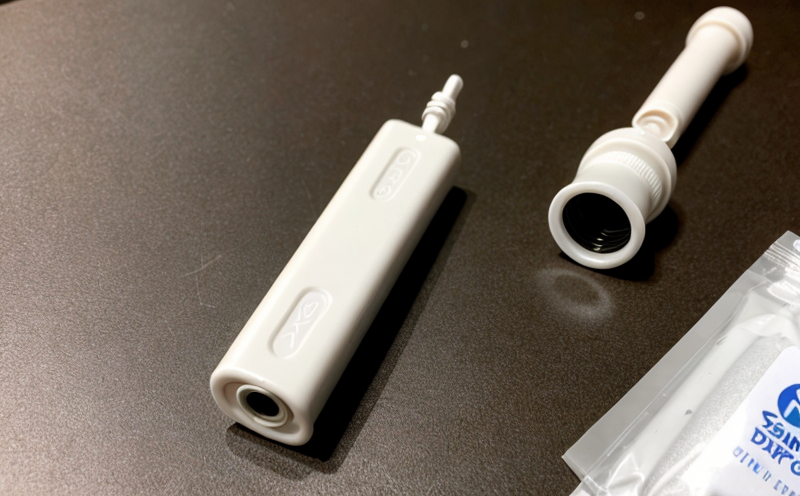ISO 11040 Prefilled Syringe Plunger Seal Testing
The ISO 11040 standard is a critical part of ensuring the integrity and safety of prefilled syringes, which are widely used in medical applications such as vaccinations, drug delivery systems, and other therapeutic treatments. This testing ensures that the plunger seal remains intact during use, preventing leakage or contamination which could lead to adverse patient outcomes.
The process involves subjecting the prefilled syringe to a series of mechanical stress tests designed to simulate real-world conditions. These tests are particularly important for single-use devices as they need to be reliable and safe throughout their shelf life until used by the end-user. The test parameters include pressure, time duration, temperature, and humidity levels that closely mirror the environment in which these devices will be used.
During testing, the plunger seal is subjected to a specified amount of fluid displacement or withdrawal under controlled conditions. This helps to assess the seal's ability to withstand the forces exerted during injection or aspiration processes without failing. The apparatus typically includes specialized equipment capable of applying precise loads and measuring displacement accurately. Compliance with ISO 11040 not only ensures product safety but also aids in meeting regulatory requirements set by various jurisdictions around the world.
Given its importance, rigorous adherence to this standard is crucial for manufacturers aiming to produce high-quality medical devices that can be trusted across different markets and applications. By ensuring consistent performance through thorough testing, companies demonstrate their commitment to quality assurance and patient safety—a key factor in gaining trust from healthcare providers and patients alike.
The results of ISO 11040 tests are reported comprehensively, detailing any deficiencies found during the test runs. This information is invaluable for identifying potential issues early on so that corrective actions can be taken before products reach the market. Furthermore, these detailed reports serve as important documentation supporting claims made about a product’s compliance with relevant standards.
Understanding why ISO 11040 matters goes beyond technical considerations; it reflects broader concerns regarding public health and safety. As healthcare systems continue to evolve towards more personalized medicine approaches, ensuring that every component used in these treatments functions correctly becomes increasingly paramount. Proper testing like that specified by ISO 11040 plays a vital role in achieving this goal.
Why It Matters
The integrity of the plunger seal within prefilled syringes is fundamental to their proper function and safety. A compromised seal can lead to leakage, which may result in reduced drug efficacy or even contamination, posing significant risks to patients. Therefore, thorough testing according to ISO 11040 is essential for maintaining product reliability throughout its lifecycle.
- Ensures consistent performance under various environmental conditions
- Promotes trust among healthcare professionals and end-users
- Aids in meeting stringent regulatory requirements worldwide
- Supports continuous improvement efforts within manufacturing processes
By adhering to these rigorous testing protocols, manufacturers can enhance their reputation for producing high-quality medical devices while also contributing positively to overall public health.
Applied Standards
The ISO 11040 standard is specifically designed for prefillable syringes and applies particularly to those with rubber or plastic plungers. It provides detailed guidelines on how to test the seal integrity of these devices, ensuring they meet specified performance criteria before being released into commercial use.
Key aspects covered in ISO 11040 include:
- Test setup and procedure
- Specimen preparation requirements
- Data acquisition methods
- Acceptance criteria for passing tests
The standard emphasizes the importance of accurate measurement techniques and controlled environmental conditions to ensure reliable test results. Compliance with ISO 11040 is crucial not only for maintaining product quality but also for satisfying regulatory expectations.
International Acceptance and Recognition
- United States: The Food and Drug Administration (FDA) recognizes ISO standards, including ISO 11040, as acceptable methods for evaluating medical devices.
- European Union: European regulatory bodies endorse the use of international standards like ISO 11040 to ensure harmonization across member states.
- Japan: The Ministry of Health, Labor and Welfare in Japan has incorporated ISO standards into its guidelines for medical device approval processes.
- Australia: Regulatory authorities in Australia also accept ISO standards as valid means of validating product compliance with local requirements.
The widespread adoption of these internationally recognized standards indicates their importance not just within individual countries but across global healthcare sectors. Manufacturers who comply with such standards gain an advantage by reducing barriers to market entry and enhancing credibility among international buyers.





